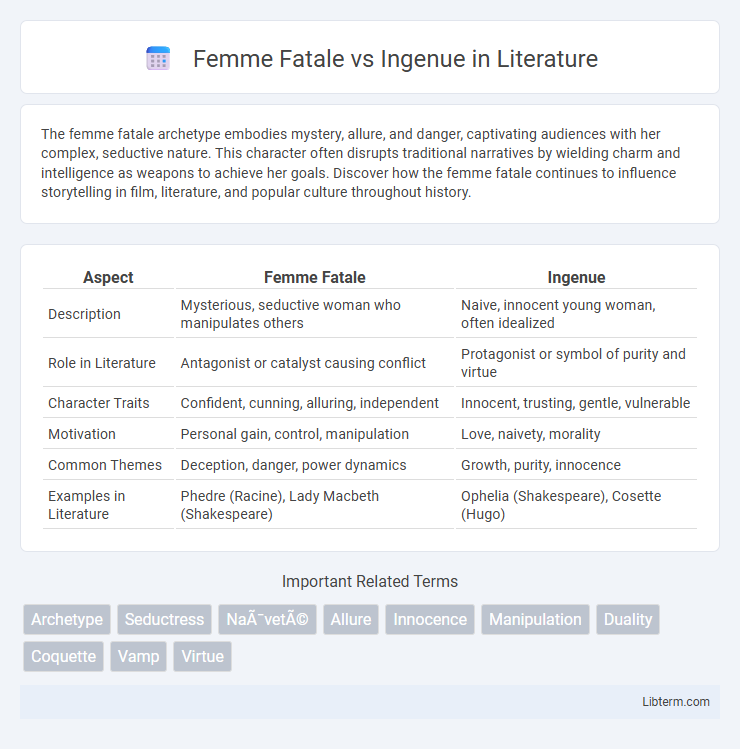The femme fatale archetype embodies mystery, allure, and danger, captivating audiences with her complex, seductive nature. This character often disrupts traditional narratives by wielding charm and intelligence as weapons to achieve her goals. Discover how the femme fatale continues to influence storytelling in film, literature, and popular culture throughout history.
Table of Comparison
| Aspect | Femme Fatale | Ingenue |
|---|---|---|
| Description | Mysterious, seductive woman who manipulates others | Naive, innocent young woman, often idealized |
| Role in Literature | Antagonist or catalyst causing conflict | Protagonist or symbol of purity and virtue |
| Character Traits | Confident, cunning, alluring, independent | Innocent, trusting, gentle, vulnerable |
| Motivation | Personal gain, control, manipulation | Love, naivety, morality |
| Common Themes | Deception, danger, power dynamics | Growth, purity, innocence |
| Examples in Literature | Phedre (Racine), Lady Macbeth (Shakespeare) | Ophelia (Shakespeare), Cosette (Hugo) |
Understanding the Femme Fatale Archetype
The Femme Fatale archetype embodies a mysterious and seductive woman who uses charm and allure to manipulate others, often leading to danger or downfall. This figure contrasts sharply with the Ingenue, who represents innocence, naivety, and purity. Understanding the Femme Fatale involves recognizing her role in literature and film as a powerful symbol of female agency intertwined with danger and complexity.
The Innocence of the Ingenue Character
The ingenue character embodies innocence, often portrayed as naive, pure, and inexperienced, creating a stark contrast to the femme fatale's cunning and seductive nature. This archetype symbolizes vulnerability and moral clarity, serving as a narrative device to highlight themes of trust, virtue, and the loss of innocence. In literature and film, the ingenue's untainted perspective often drives emotional engagement and prompts character development in others.
Historical Origins of Femme Fatale and Ingenue
The historical origins of the femme fatale trace back to ancient mythology and literature, where seductive women embodied danger and mystery, such as the Sirens in Greek mythology and biblical figures like Delilah. The ingenue archetype emerged prominently during the 18th and 19th centuries in theater and literature, symbolizing innocence, youth, and naivete, often portraying a pure and virtuous young woman. These contrasting archetypes served as cultural reflections of societal attitudes towards femininity, morality, and power throughout history.
Key Traits: Femme Fatale vs. Ingenue
The Femme Fatale embodies mystery, seduction, and independence, often wielding power through allure and manipulation, while the Ingenue represents innocence, naivety, and vulnerability, characterized by purity and trust. Key traits of the Femme Fatale include confidence, cunning, and a strong, often dangerous allure, contrasting with the Ingenue's gentleness, sincerity, and submissiveness. These archetypes illustrate opposing dimensions of femininity in literature and film, highlighting complex social dynamics and character motivations.
Iconic Femme Fatales in Film and Literature
Iconic femme fatales in film and literature, such as Phyllis Dietrichson in "Double Indemnity" and Catherine Tramell in "Basic Instinct," embody seductive mystery and dangerous allure, often manipulating men to achieve their hidden agendas. These characters contrast sharply with ingenues like Ophelia in Shakespeare's "Hamlet," who represent innocence, naivety, and vulnerability. The femme fatale archetype highlights themes of power, control, and subversive femininity, making them enduring figures in storytelling and cultural analysis.
Memorable Ingenues in Classic Stories
Memorable ingenues in classic stories often embody innocence, purity, and naivety, capturing audiences with their vulnerability and earnestness. Characters like Ophelia in Shakespeare's "Hamlet," Juliet in "Romeo and Juliet," and Daisy Buchanan in "The Great Gatsby" represent the quintessential ingenue archetype. These figures contrast sharply with femme fatales, highlighting themes of innocence versus cunning in literary narratives.
Gender, Power, and Agency: Archetypes Explored
The Femme Fatale archetype embodies a complex interplay of gender, power, and agency by challenging traditional female roles through seduction and strategic manipulation, often wielding control in male-dominated narratives. In contrast, the Ingenue represents innocence and vulnerability, embodying societal expectations of feminine purity and passivity, which typically limits her autonomy and influence within storylines. These archetypes illuminate cultural perceptions of women's power and agency, reflecting broader gender dynamics and the negotiation of control in storytelling.
The Evolution of Femme Fatale and Ingenue in Pop Culture
The femme fatale and ingenue archetypes have evolved distinctly in pop culture, with the femme fatale transforming from a mysterious, dangerous seductress in film noir to a complex symbol of female empowerment and rebellion in modern media. The ingenue, traditionally characterized as an innocent and naive young woman, has expanded to embody nuanced vulnerability and strength, reflecting shifting societal attitudes toward femininity. This evolution highlights how contemporary narratives challenge and redefine gender roles, blending classic traits with progressive themes to create multifaceted female characters.
Psychological Impact of These Archetypes
The Femme Fatale archetype often evokes psychological responses linked to intrigue, danger, and empowerment, influencing perceptions of autonomy and mystery in interpersonal dynamics. Conversely, the Ingenue archetype triggers associations with innocence, vulnerability, and naivety, shaping emotional responses related to protection and trustworthiness. These contrasting archetypes affect cognitive and emotional processing in narratives, reflecting societal attitudes towards femininity and power.
Femme Fatale vs. Ingenue: Modern Interpretations
The Femme Fatale archetype embodies a seductive, mysterious woman who wields power through allure and cunning, frequently challenging traditional gender roles. In contrast, the Ingenue represents innocence and naivety, often depicted as pure and vulnerable, embodying idealized youthfulness. Modern adaptations subvert these stereotypes by blending traits, portraying Ingenues with agency and Femme Fatales with emotional depth, reflecting evolving views on femininity and empowerment.
Femme Fatale Infographic

 libterm.com
libterm.com